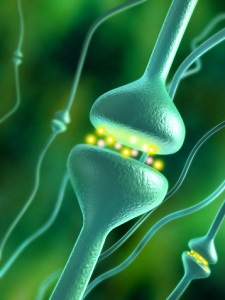Neurotransmitters
 A neurotransmitter is a chemical released by a neuron that either amplifies or inhibits the transmission of signals between neurons.
A neurotransmitter is a chemical released by a neuron that either amplifies or inhibits the transmission of signals between neurons.
Neurotransmitter Process
Neurons send signals to other neurons across tiny gaps called synapses. When a nerve impulse triggers a signal, the neuron’s axon releases the neurotransmitter. The neurotransmitter binds to receptors within the postsynaptic membrane and affects the signal sent across the synapse.
Examples of Neurotransmitters
There are many neurotransmitters, but a few have received attention due to their role in mental health conditions. Commonly-known neurotransmitters include:
- Acetylcholine – The first discovered neurotransmitter, this chemical plays an important role in REM sleep.
- Dopamine – Dopamine is associated with reward-inducing brain mechanisms, and has an inhibitory effect on signals traveling across neurons.
- GABA – GABA is usually inhibitory and frequently plays a role in inhibiting anxiety-producing signals.
- Serotonin – This inhibitory neurotransmitter plays a vital role in mood regulation.
Role in Psychology
Contemporary psychology increasingly recognizes the role neurotransmitters play in mental health conditions, particularly mood disorders. For example, serotonin levels can play a part in mood disorders such as depression. Serotonin has also been linked with obsessive-compulsive disorder and anger management problems.
The neurotransmitter dopamine is important for understanding addiction. Drugs such as cocaine and heroin increase dopamine levels and inhibit nerve signals that can lead to negative feelings. The increased dopamine increases the addict’s desire to use the drug. Schizophrenia may result from excessively high levels of dopamine.
Psychiatrists commonly prescribe selective serotonin reuptake inhibitors to clients with depression and anxiety. These medications can help regulate serotonin and improve mood. However, not all mood disorders are caused by serotonin issues, so these medications do not work for everyone. Further, clinicians typically diagnose based on symptoms, so there is no way to know how many patients suffer from depression due to neurotransmitter issues rather than due to other problems.
References:
- Boeree, C. G. (n.d.). Neurotransmitters. Retrieved from http://webspace.ship.edu/cgboer/genpsyneurotransmitters.html
- Kring, A. M., Johnson, S. L., Davison, G. C., & Neale, J. M. (2010). Abnormal psychology. Hoboken, NJ: John Wiley & Sons.
Last Updated: 08-12-2015
- 5 comments
- Leave a Comment
Briget
July 2nd, 2021 at 5:09 PMVery informative! Easy to understand! Thank you so much for this article!
David
March 8th, 2022 at 6:03 PMMy cell door was never locked I just had to open it.
Melanie
September 13th, 2022 at 10:44 AMLeave my kid alone!
Leave a Comment
By commenting you acknowledge acceptance of GoodTherapy.org's Terms and Conditions of Use.

